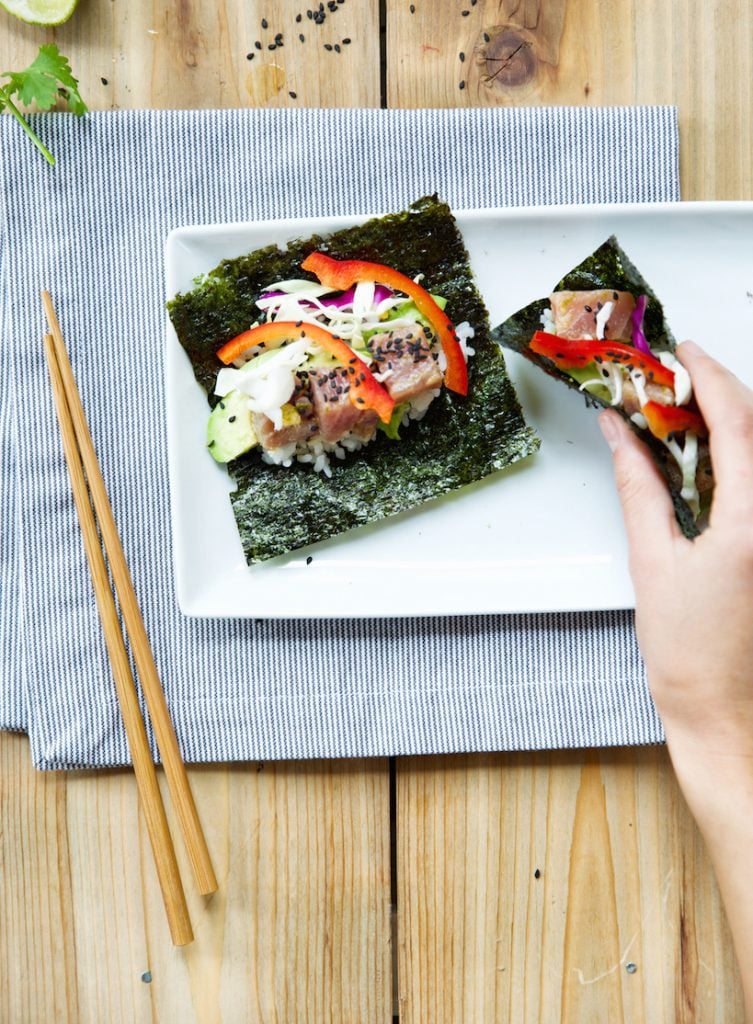In a world where chlorophyll water saturates our social feeds and demand for green juices depletes our bank accounts, it’s obvious: getting more of the good stuff is top of mind. And while we’re all doing the work of incorporating leafy greens into our meals, a new class of superfoods is taking the wellness industry by storm. In 2023, we’re looking to the sea as a source of vitamins and nutrients—and that’s where a rising interest of nori health benefits comes into play.
Of course, nori has long been a staple superfood in Asian cultures. But in the West, particularly among Millennials and Gen X, nori is going way beyond our sushi orders. Seaweed snacks are flooding the market and the wellness-obsessed among us are experimenting more and more with nori in our own kitchens. (For context, Pinterest reported a 245% increase in the search term “seaweed snacks recipes.”)
Featured image by Ashleigh Amoroso.


Nori Health Benefits: A Dietitian Weighs In
But we can’t emphasize it enough: while the sea veggies appear to be going “mainstream,” nori and the like are crucial components of cuisines including Japanese, Korean, and Filipino food. They’re nutrient-dense, rich in vitamin C and iron—but nori health benefits stretch even further.
For insight into the superfood staple, we spoke with Chicago-based Registered Dietitian May Zhu. Below, May shares everything from nori’s key benefits to creative and delicious ways to incorporate the seaweed into your everyday diet. Keep reading for all you need to know.

What are the health benefits of nori?
As we prefaced above, prepare yourself: nori health benefits are vast. It’s a solid pick for everything from fiber to phytonutrients to antioxidants. (And PSA: it’s time to make nori a part of your anti-inflammatory routine.) Below, May breaks it down further.
May support hearth health.
Nori contains omega-3 fatty acids (EPA, specifically) which helps lower the risk of heart disease when consumed as a part of a healthy diet low in saturated fats.
Contains anti-inflammatory properties.
Antioxidants in certain edible sea vegetables block the COX-2 enzyme (also known as cyclooxygenase-2 enzyme) and in return also reduces an inflammatory mediator called prostaglandin E2 (PGE2). Both are largely known to be responsible for causing inflammation. The polyunsaturated fatty acid content, including essential fatty acids EPA and DHA, also may contribute to the anti-inflammatory effects.
May help balance blood sugar and increase satiety.
Nori contains small amounts of protein and fiber, which together can help curb hunger and increase satiety.
Contains bio-available iron.
In a study conducted at the University of Hawaii, 13 varieties of edible seaweed were studied. It was found that nori provided more bioavailable iron (the available amount our bodies can absorb) compared to what you get from eating the same amount of spinach. Iron supports the immune system and affects the way our body produces and uses energy.
May support hair and skin health.
Iodine aids in promoting healthy skin and nails. It works at the cellular level to regenerate lower layers of the skin. Conversely, iodine deficiencies can lead to dry skin and hair.
Good source of vitamin C.
A 2/3 cup serving of nori contains around 65% the daily recommended value of vitamin C, which the body needs to support immunity, bone, and skin health.
May support gut health.
Nori contains fiber that consists of natural polysaccharides, which act as a prebiotic to promote a healthy gut microbiome. A healthy and diversified gut microbiome can support immunity and better digestion.


What particular nutrients in nori make it a supportive food for your health?
Vitamins and Omega-3 Fatty Acids
In short, nori is dried seaweed (classified under red algae), which is low in calories and contains nutrients like vitamins A, B, and C. It also contains omega-3 fatty acids (EPA), which are essential fatty acids that our bodies need but cannot make, so we have to obtain directly through food sources. Consuming foods with EPA can help support heart health by lowering the risk for cardiovascular disease.
Iodine
In addition, seaweed in itself is rich in iodine which can help support thyroid function. While iodine deficiencies in the US are rare, we have to obtain iodine specifically through food as well. The recommended daily intake for iodine is 150 micrograms for most adults (more for those who are pregnant or nursing). One serving (five grams) of dried nori provides around 116 micrograms of iodine, which is 77% of the RDI for adults.
Remember: Diversify Your Diet
Remember that a healthy diet is about our total food choices over time and not just one meal or food, so nori can definitely be a part of a nutritious diet in moderation. One of the best things we can do for our health is to diversify our food choices to keep our nutrient and mineral varied.


Is seaweed safe for everyone to consume?
Seaweed is generally safe in moderate amounts for most healthy people. While seaweed does not contain the same animal proteins found in shellfish, there is a risk of cross-contamination. Therefore, if you have a severe shellfish allergy it’s generally recommended to avoid seaweed as well. In addition, if you are on any medications or have an underlying health issues, it’s best to consult with your doctor before adding nori to your diet to avoid any interference with medications.
And while the iodine in nori can support thyroid health, overconsumption can worsen symptoms in those who are dealing with hypothyroidism, so it’s best to limit or consume in moderation if you struggle with the above.


How to Add Nori to Your Diet
Nori can be an incredibly versatile ingredient to give your meals an extra nutrient boost. It’s naturally salty and provides an “umami” flavor. In addition to being a snack on its own or part of sushi, nori sheets can be used as wrap, added in soups for more flavor, or cut into smaller pieces and used as a garnish for salads or rice bowls. I love recipes like this easy Nori Rice Bowl w/ Tofu and Avocado or Nori Seaweed Popcorn.





